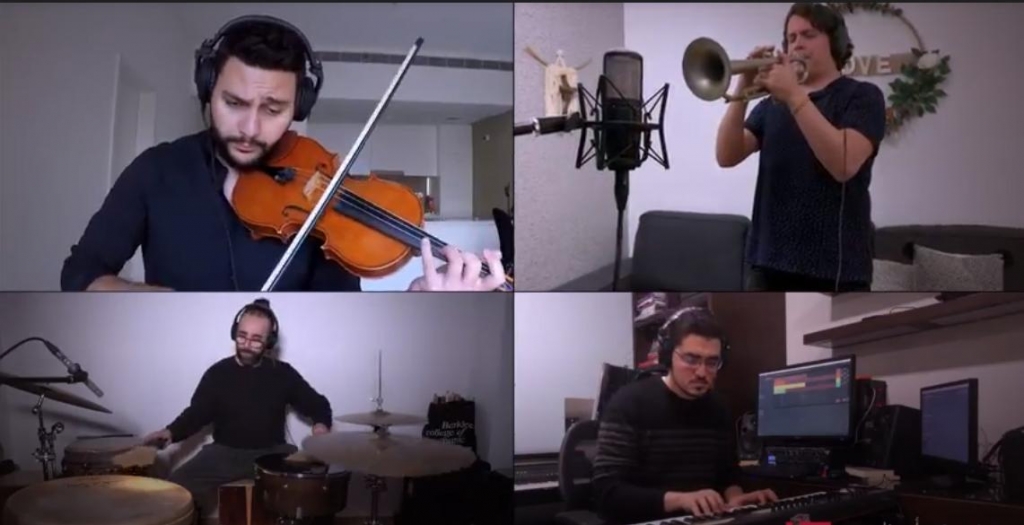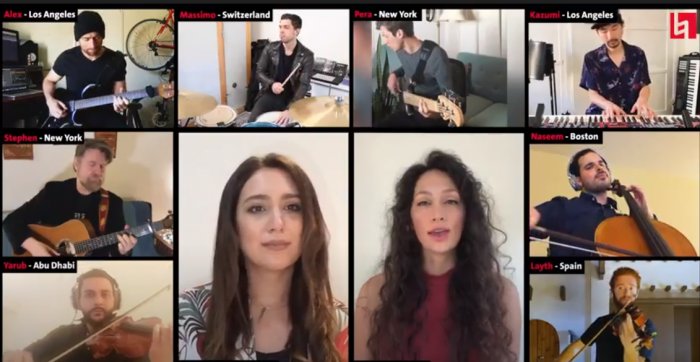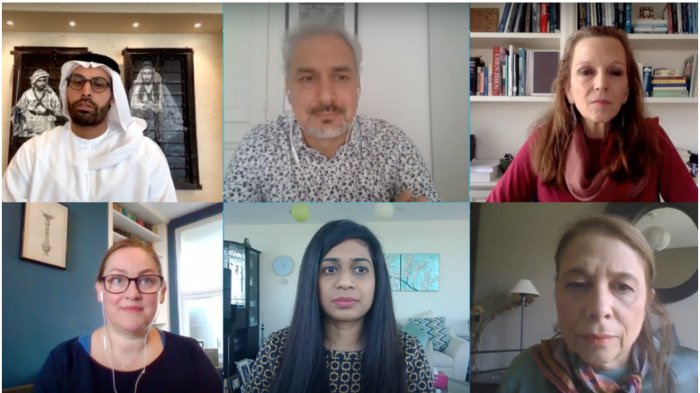
Culture Summit Abu Dhabi Tackles Issues of Culture in Crisis in Wide-ranging Panel Discussion
Session was followed by musical performances curated by Berklee Abu Dhabi
In the absence of a 2020 event, Thursday evening the Department of Culture and Tourism – Abu Dhabi (DCT Abu Dhabi), in collaboration with global cultural organisations, broadcast a special Culture Summit Abu Dhabi live stream experience on the summit’s YouTube channel.
Chaired by HE Mohamed Khalifa Al Mubarak, Chairman of DCT Abu Dhabi, the panel session ‘Alone Together: Culture and Resilience’ featured distinguished participants Ernesto Ottone Ramírez, Assistant Director-General for Culture, UNESCO; Alexandra Munroe, Samsung Senior Curator of Asian Art and Senior Adviser, Global Arts, Solomon R. Guggenheim Museum and Foundation; Rebecca Lyons, Director of Collections and Learning, Royal Academy of Arts; Melanie Noronha, Senior Editor, Thought Leadership, Europe, Africa and the Middle East, The Economist Intelligence Unit; and Marisa Henderson, Chief, Creative Economy, UNCTAD.
DCT Abu Dhabi Chairman HE Mohamed Khalifa Al Mubarak introduced the session, reminding viewers that Culture Summit Abu Dhabi was conceived from a strong shared belief in the power of culture: to enact positive change, to inspire and heal, and to lift up communities. He pointed out that culture is what links us all, no matter who or where we are, and in a time of anxiety and isolation it is more important than ever. In times of crisis, culture is a beacon of light; it acts like a medicine, helping us to heal. Noting the cancellation of Culture Summit 2020 due to the global health crisis, HE Al Mubarak made the welcome announcement that the next edition of Culture Summit Abu Dhabi is planned for March 2021, under the theme The Cultural Economy and the Economy of Culture.
Kicking off the discussion was the question of the impact of the global pandemic on artists and cultural institutions. UNESCO’s Ernesto Ottone Ramírez explained that the crisis has hit culture sector very hard, affecting the entire creative value chain as many artists and creators around the world are now unable to make ends meet. With 89% of all cultural sites closed or partially closed, the situation is cutting off livelihoods. As institutions lose millions and are forced to let staff go, the consequences are devastating and the cultural ecosystem has been rendered more fragile. Ramírez also noted that while much content has migrated online, much of the world doesn’t have access to technology and the internet. These people are in just as much need of access to culture so we must do whatever possible to reach them and find new solutions.
Huge Hit for Culture
Marisa Henderson of UNCTAD discussed the severity of the economic situation worldwide, noting that the slowdown in manufacturing and decreasing exports are having a huge impact on developing countries in particular. Added to this is the fact that developing countries can’t put together the same level of stimulus packages as developed nations. Within this context, Henderson said, cultural and creative services are taking a huge hit, even more so compared to the 2008 global recession. Technology services seem to be the lifeline for all of us now.
In response to the next question – how are cultural institutions dealing with this situation? – Rebecca Lyons of London’s Royal Academy of Arts explained the current struggle of the Royal Academy, being an artist-founded and led institution which is totally reliant on revenue generation from visitors, members and donors. The enormous challenge faced is how to engage and retain audiences in the absence of any revenue streams. While coping with the crisis, the team is trying its best to minimise impact while keeping the spirit of who they are alive.
The Economist Intelligence Unit’s Melanie Noronha said that the media is faring much better than other facets of the cultural economy. Though facing issues with not being able to engage in field work or face to face collaboration with colleagues, journalists can still utilise technology to do research and conduct interviews remotely. Noronha went on to say that lately she has been reflecting on the role of researchers and journalists, and believes that they have never been more important, particularly given the amount of misinformation that is out there. In the midst of this current crisis, when people are constantly looking for updates, the media must respond by continuing to deliver fact-based reporting and avoiding unnecessarily divisive rhetoric.
Beyond the Pandemic
HE Al Mubarak then directed a question to Alexandra Munroe of the Solomon R. Guggenheim Museum and Foundation, asking what further challenges, beyond the pandemic, are facing museums and cultural institutions today. Munroe stated that culture itself, as a concept, is not in crisis. Rather it is our institutions, and the artists and performers who create culture, that are in crisis. The solidarity we are seeing around the world, such as the balcony concerts; that is culture. It is a response to the assault on our way of life, and that solidarity is a form of immunity. Munroe noted that this is not the first time that institutions have been impacted in a similar way – most recently, both 9/11 and the 2008 recession affected travel, visitor numbers, and donations. Right now, the issue is closures and philanthropists diverting their money to more urgent causes, but we need to see this as one moment in a resilient history. The biggest challenge for museums is to find new ways of being relevant at this moment in time, serving their communities and offering solace and relief.
Addressing what the role of culture is in this crisis, Ernesto Ottone Ramírez said that given that this crisis is truly global, affecting every institution, the situation has given them something new: it has allowed them to explore technology in new ways and in many cases, provided them with even bigger audiences. He noted that what is important in the end is that culture is our identity, and this period of isolation will show us the importance of culture in our everyday lives. Ramírez said his hope is that post-crisis, society and policy makers will realise the importance of supporting artists and the creative sector. The culture sector is always given last priority and hopefully this will be reconsidered after the crisis.
Innovative Responses
Next was the question: What are the innovative way institutions and the sector are responding? Alexandra Munroe said that the Guggenheim’s content produced for its social channels and website has been a stunning success, reaching bigger audiences and seeing higher levels of participation and engagement than ever before. She noted that despite the negative view of globalisation that has emerged in some circles over the past couple of decades, this moment seems to have shifted our understaffing of globalisation, as we remember something fundamental – our shared humanity. Culture cannot be decoupled from society and community. Furthermore, it is not merely commercial entertainment, but an encounter.
Marisa Henderson added that the demand for the digital economy never been greater, now that we are using the internet not only for school and work but to be entertained. She noted that as jobs in the creative industries are some of the most vulnerable, it is essential that we build resilience and ensure protections are in place. Henderson said she is greatly encouraged by the resilience and creativity of artists, who have been staging home concerts and performances for all to enjoy for free access over the web. It is important to continue this even after crisis is over.
Addressing the merits and failures of virtual presence for museums, Rebecca Lyons said that flexibility and adaptability when thinking about how to reach and engage audiences in paramount. She noted that resilience is something one learns as an artist, learning to try and fail again and again, and institutions must not be afraid to do the same. It is so important that art is something that engages and is collaborative, so with digital content, it is crucial that audiences interact and come together.
Melanie Noronha added that she finds it commendable that institutions around the world have provided universal access to their assets during these troubling times. However, she noted that it is important to recognise the shortcomings when translating content to the digital word, chief of which is that the virtual experience can’t always deliver the same awe and inspiration as real life. Another important point is that while technology is always evolving and offering more advanced options, such as 360 videos, financial issues often ensure that these are only available to larger institutions. She said it is important to recognise these challenges when thinking about what the new cultural economy might look like.
Future Proof
HE Al Mubarak observed that this is likely not the last time such a crisis will befall the creative sector, and that we need the tools to “future proof” culture. When this situation happens again, we must be ready.
He then asked what the future might look like for the cultural economy and its practitioners. Melanie Noronha noted that all is conjecture at this point, and everything depends on how this pandemic will pan out. The main issue is the uncertainty around the length of the lockdown period, and institutions must be prepared for any scenario, whether that be a prolonged lockdown or a series of short repeated ones. She said that while we must be realistic, she is optimistic about the power of the human ingenuity that drives the cultural sector, and believes it will deliver solutions to these challenges.
Speaking to how the cultural landscape might be impacted post-crisis, Ernesto Ottone Ramírez said that we must change everything – our attitude to culture, how we safeguard our heritage sites, etc. – and it must be a global effort. He noted that UNESCO is hoping to put together recommendations for this.
The participants then provided some closing thoughts, with Rebecca Lyons encourage people around the world to get involved with creative projects in any way they can. She emphasised that culture and art is for everyone, and she would like to see an increase in democratic participation in the arts. Lyons expressed the hope that cultural engagement might aid in lessening isolation and breaking down barriers, even those that existed even the current situation.
Alexandra Munroe noted the need for collaboration going forward, saying that we must capitalise on this newfound sense of solidarity and collegiality, and larger institutions must help the smaller but still essential ones.
HE Al Mubarak noted that difficult times often provide opportunities, and drew the discussion to a close with an announcement: the formation of a task force to monitor the situation in the cultural sector and provide the analysis needed to effectively respond. He observed that culture is ever evolving, but a constant. It defines us, so we should commit to it.
Musical performance
The panel discussion was followed by a special performance by American Grammy-winning and Emmy-nominated songwriter-producer Desmond Child, and ‘two’ collaborative musical performances curated by Berklee Abu Dhabi. Child performed some of his original tunes, as well as a cover of one of his favourite songs, “Weird” by Hanson. A Berklee Valencia and Berklee Abu Dhabi remote collaboration saw a rendition of “Min Makan”, an original instrumental Arabic fusion song composed by Jordanian violinist Yarub Smarait, performed in collaboration with Berklee Valencia alumni. Finally, “When You Believe”, a remote collaboration between Berklee Boston, Berklee Valencia and Berklee Abu Dhabi, featured Berklee College of Music alumni from around the world, as well as singer-songwriters Mayssa Karaa and Lilla, performing a special rendition of the famed Whitney Houston/Mariah Carey song from the 1998 animated musical drama The Prince of Egypt. With a theme that is fitting in these uncertain times, the song tells us that although fear exists, positive things will come if we believe and don't ever give up.
For more information about Culture Summit Abu Dhabi, please visit www.culturesummitabudhabi.com.
About the Department of Culture and Tourism - Abu Dhabi
The Department of Culture and Tourism conserves and promotes the heritage and culture of Abu Dhabi emirate and leverages them in the development of a world-class, sustainable destination of distinction, which enriches the lives of visitors and residents alike. The organisation manages the emirate’s tourism sector and markets the destination internationally through a wide range of activities aimed at attracting visitors and investment. Its policies, plans and programmes relate to the preservation of heritage and culture, including protecting archaeological and historical sites and to developing museums, including Zayed National Museum, Guggenheim Abu Dhabi, and the Louvre Abu Dhabi. DCT - Abu Dhabi supports intellectual and artistic activities and cultural events to nurture a rich cultural environment and honour the emirate’s heritage. A key role is to create synergy in the destination’s development through close co-ordination with its wide-ranging stakeholder base.
Culture Summit Abu Dhabi
Culture Summit is a forum that convenes leaders from the fields of the arts, design, heritage, media, museums, public policy and technology, to identify ways in which culture can transform societies and communities worldwide. In April 2019, Culture Summit welcomed over 480 participants from 90 countries, and presented a series of expert-led panels and workshops on art, museums, cultural heritage, media and technology.
The Summit is organised by the Department of Culture and Tourism – Abu Dhabi in collaboration with five global partners that curated and led on their specific area of expertise. These partners are the Royal Academy of Arts, UNESCO, Guggenheim, The Economist Events and Google.
The theme of 2019’s programme was Cultural Responsibility & New Technology. A series of panels, performances and workshops throughout the event engaged participants on their ideas about the role of culture in improving our world.




























